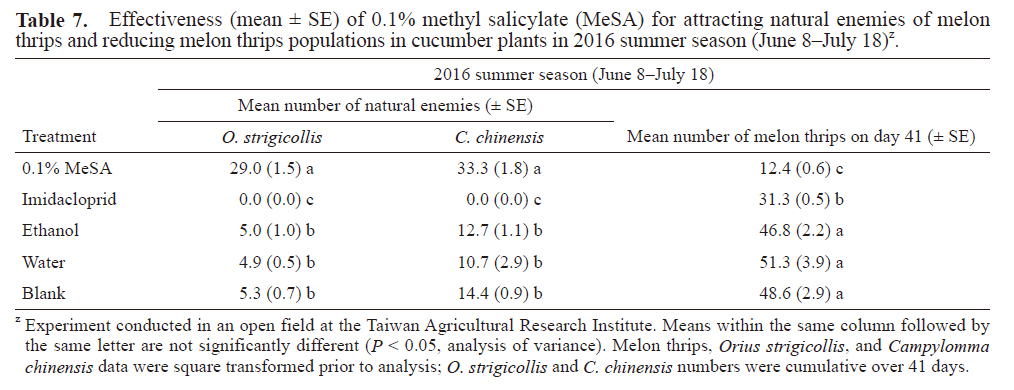All issues

Author:Yaw-Jen Dong and Bei-Chen Hsiu*
Abstract:
This study investigates the effectiveness of methyl salicylate (MeSA) to attract natural enemies and to reduce melon thrips (Thrips palmi Karny) population in cucumber plants. High numbers of natural enemies of melon thrips, namely, Orius strigicollis Poppius and Campylomma chinensis Schuh, were trapped on the yellow sticky paper baited with MeSA; however, levels of attraction differed with concentration and season. Significantly fewer melon thrips were found through 0.1% MeSA treatment than through imidacloprid, ethanol, water or unbaited treatments in studies conducted in winter season of 2015 and summer season of 2016. Furthermore, significantly more O. strigicollis and C. chinensis individuals were found through 0.1% MeSA treatment than through imidacloprid, ethanol, water or unbaited treatments in these two seasons. In summary, our results demonstrate that 0.1% MeSA treatment has potential to replace insecticides as a melon thrips control tool. Large-scale farmland tests are necessary to confirm the efficiency of this treatment and related conservative bio-control strategies before further use.
Key words:Cucumber, Melon thrips, Methyl salicylate, Bio-control
Download:![]() PDF Links
PDF Links
- 1. Development of Tractor-Mounted Seedling Transplanter for Sweet Potato
- 2. Synergistic Effect of Additional Gas on the Toxicity of Phosphine to Sitophilus oryzae and Sitophilus zeamais (Coleoptera: Dryophthoridae)
- 3. Effects of Temperature and Solar Radiation on Growth Traits and Plant Elements in Purple Leafy Sweet Potato
 Submit your manuscript
Submit your manuscript
 Guide for authors
Guide for authors